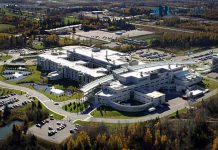

THUNDER BAY – Health News – Closer-to-home care. That has always been the goal for Regional Cancer Care Northwest (RCC). For well over 12 years now, 13 satellite sites throughout Northwestern Ontario have provided chemotherapy and other cancer care services to patients from Red Lake in the west to Hearst in the east.
Most are oncology patients at the cancer centre in Thunder Bay, but some patients in western communities like Kenora or Dryden may have an oncologist in Winnipeg.
“It’s no different – they are getting the same care no matter where they are,” said Sharon McKinnon, Manager of Cancer Treatment Programs at RCC. “Every patient is still connected with their medical oncologist.”
Each satellite site has a dedicated cancer care team. This is usually comprised of one or two Family Physicians who act as medical leads for the Regional Systemic Treatment Program; several nurses, many of whom have specialized oncology certification from the Canadian Nurses Association (CNA); and the pharmacy team at each host hospital, who prepare each chemotherapy treatment.
Some community programs also have access to other care providers in their hospitals like social workers and palliative care specialists.
Although having chemotherapy administered at regional hospitals doesn’t eliminate all travel – patients must still visit their medical oncologist in Thunder Bay before treatments start – it does reduce the amount of travel. This is more convenient for patients who aren’t always up for travelling during chemotherapy. It’s also safer during the winter months when driving can be hazardous.
But there are other advantages too.
“Cancer patients need other supports besides the medical team,” McKinnon said. “You need family, you need friends. For some people it’s their colleagues. Everyone has different supports, but when you go away from where you live, you’re just not going to have them.”
In recent years, Telemedicine has played a larger role in providing that quality care. Every satellite site in the region now has its own dedicated Telemedicine equipment so patients can have follow-ups and other consultations with their oncologist via videoconference. This also makes it easier for nurses to attend videoconferenced monthly meetings and educational sessions.
Cancer care professionals throughout the region are also supported by the annual Community Oncology Professional Education (COPE) workshop. Through presentations, Q&As, and other collaborative activities, COPE provides cancer care providers across Northwestern Ontario with vital information about the latest advances in cancer care, and how they impact cancer care in our region.
Safety is the number one concern when it comes to supporting regional hospitals. Last spring, RCC medical oncologist Dr. Nicole Laferriere took on the role of Regional Systemic Therapy Lead to oversee quality and safety in regional programs.
“Our goal is to deliver chemotherapy in the region as safely as we do at the cancer centre in Thunder Bay,” Dr. Laferriere said. “We’re doing that successfully through the safety collaboratives established with Cancer Care Ontario (CCO) and our regional partners.”
Bottom line: cancer patients throughout the region can safely receive chemotherapy without travelling all the way to Thunder Bay.
“Patients are getting good, quality cancer care close to their home,” McKinnon said.






